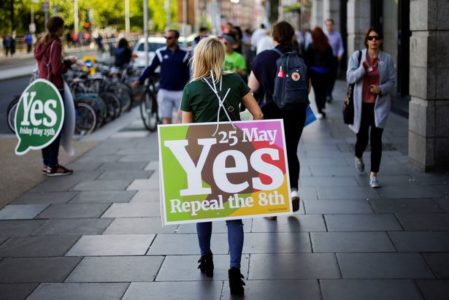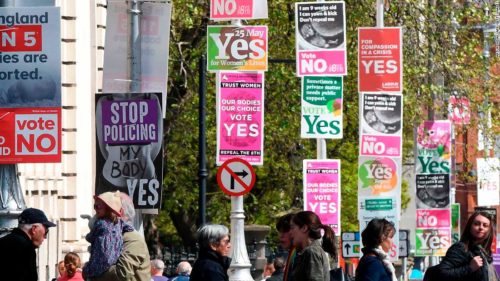Time to move on, time to get going
The Outcome of the Irish Referendum

Yes supporter in Dublin (Mirror)
Last week I asked many of my Irish friends what were their plans for the weekend, expecting the usual answers, especially due to the nice weather and a tough working week. However, I was impressed to see that most of them went home for a couple of days, and the reason was explicitly to vote at the highly publicised referendum to repeal the Eighth Amendment of the Constitution, that dates back to 1983 and sets out that the life of the unborn is equal to that of the mother, essentially forbidding abortion in the vast majority of circumstances.
The Republic of Ireland is a relatively small country, consisting of somewhat less than 5 million people, but with a dominant Roman Catholic majority. It is due to this strong religious influence that Ireland has for a long time been a very conservative society, and as a result, was banning abortion unlike many other European states. That is why the results of the Irish referendum last Friday, which showed that basically two-thirds of Irish voters voted for a pro-choice cause, is an important message.
As voting is only possible in Ireland, many Irish expats decided to travel back to their country and to do their citizens’ duty. The voter turnout was 64,13 percent, something that in many European countries would be impossible, regardless of the type of election/referendum. The debate was full of emotion and reflected the complex past of Ireland, which includes strong national, cultural and religious pride.
By the looks of things, the majority of the population was aware of all the cruel situations that women had to suffer due to the current law. For example, women were forced to travel abroad to receive an abortion, meaning that some women could not receive such healthcare due to economic circumstance. The well-known case of Savita Halappanavar was an especially brutal one. The young lady died in a hospital because the staff could not abort a fetus that did not have a chance of survival. All these issues were raised in public.

Referendum Posters in Dublin (ARTUR WIDAK/AFP/Getty Images)
The referendum results opened up a debate about Irish society which goes far beyond the debate on abortion, providing a straightforward look at one of the most interesting countries in Europe. The Irish society, especially the new generation, are now the forerunners of a country that once stood as a very poor and a socially conservative country.
Basically, what is happening now is that there is an ongoing change of generation in Ireland that is shifting the country onto a progressive path. While some countries in Europe are strongly reverting to conservativism, Ireland is actually doing quite the opposite. It is even more encouraging for progressive forces that the vote was supported through most age and gender varieties, with only the Donegal constituency being narrowly against it.
When I questioned my well-informed Irish friend some time ago, as I wondered how Ireland quickly recovered from the economic crisis, and enjoyed the Celtic tiger in the first place, he replied: By reforming the economy and not letting conservative figures to hold us back. Of course, not all Irish people would agree with this, but there is a certain tendency one could see. In the framework of Brexit and the never-ending populist threats, never ever has the image of Ireland in the international media been so good.
If we disregard the annual bar hopping of St. Patrick’s Day, or the case with Apple and other IT giants, Ireland has clearly positioned itself in the international media by voting for the same-sex marriages in 2015, by appointing a gay and a minority background Prime Minister a year ago, and these days by showing how the current generation is changing the country. One could say that it is a one small step for the World, but a one giant leap for Ireland.
